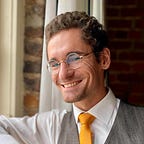Are you really yourself?
In my favorite existential comedy “I Heart Huckabees,” two existential detectives hound Jude Law’s character (a successful but inauthentic business executive) until he cries out in exasperation: “How am I not myself?” This becomes the mantra that destroys his career, ruins his marriage, and ultimately, brings him face to face with himself.
Like Jude Law’s character, we are not ourselves. The philosopher Martin Heidegger said that we aren’t so much born as “thrown” into existence. We don’t choose our parents. We don’t choose the country we’re born in. We don’t choose the regime we live under nor the genes we live with. In so many ways, we are not ourselves: we are the outcomes of our circumstances. In other words, we don’t just exist into the world, we have emanated from it.
This is a powerful reconceptualization of what “we” are. Rather than static and independent entities, we can perhaps more accurately understand ourselves as the result of an unfolding process. Our frontal cortex produces a stable sensation of an “I” marked by the boundaries of the body. In some ways, it’s a useful notion. But as modern psychology and ancient Buddhism will tell you: that sense of “I” is an illusion. With the right drugs or enough practice, the sense of self, or its boundaries, can be dissolved. And what’s more, that “ego death” doesn’t result in actual death. Far from it. The body and mind go on living just fine without that sense of self.
I prefer to remind myself that I, like Jude Law’s character, am not myself. I am the result of the vast and complex cascade of past processes — a twig on the tree of life — a minuscule droplet of that ongoing explosion we call the “Big Bang.” My preference for water and air, my eyesight and intellect, my body and its instincts, are not my own but gifts of a long and ancient process that has its origins in the nuclear furnace of the primordial universe. And what I haven’t inherited by genetics I inherited by circumstance. What I conceive of as “myself” has arisen as a single wave from the sea of reality. And you can’t extract a wave from the sea.
We are each “waves” that have been caused by other waves. We have an intrinsic momentum that carries on toward a shore we cannot see. Once we reach it, our wave-form will crash or fizzle out. The “I” will disappear — though it was never truly there to begin with. The fizzy “stuff” of existence is never lost but emanates outward throughout the world. If we understand ourselves as emanations that arise, exist, and pass on with little relation to our sense of self, the we can understand what the philosopher Arthur Schopenhauer meant when he said that “everything is always there and in its place, just as if everything were imperishable … Notwithstanding thousands of years of death and decay, nothing has been lost.”
Practice: “Why am I doing this?”
In his book Prometheus Rising, Wilson recommends numerous practices meant to give the reader insight into the concepts of consciousness he writes about. I’ve adapted this meditation from the book that I think does a good job of illustrating the ways in which we are not ourselves but rather emanate from the world:
Sit in a room where you will not be disturbed … begin thinking, “I am sitting in this room doing this exercise because . . .” and list as many of the “causes” as you can think of. For instance, you are doing this exercise because, obviously, you read about it in this [email.] Why did you read this [email]? Did somebody recommend it? How did that person come into your life? … Why do you read [emails] of this sort — on psychology, consciousness, [spirituality] etc.? How did you get interested in those fields? Who turned you on, and how long ago? What factors in your childhood inclined you to be interested in these subjects later? Why are you doing this exercise in this room and not elsewhere? Why did you buy or rent this house or apartment? Why are you in this city and not another? Why on this continent and not another? Why are you here at all — that is, how did your parents meet? Did they consciously decide to have a child, do you happen to know, or were you an accident? What cities were they born in? If in different cities, why did they move in space-time so that their paths would intersect? Why is this planet capable of supporting life, and why did it produce the kind of life that would dream up an exercise of this sort? Repeat this exercise a few days later, trying to ask and answer fifty questions you didn’t think of the first time. (Note that you cannot ever ask all possible questions.) Avoid all metaphysical speculations (e.g., karma, reincarnation, “destiny” etc.). The point of the exercise will be mind-blowing enough without introducing “occult” theories, and it will be more startling if you carefully avoid such overtly “mystical” speculations.
